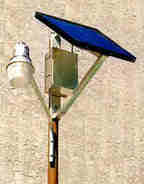medium term approaches
Solar Water Heaters:Greywater Heat Exchange:While retrofitting a house completely with solar voltaic cells for power generation is not yet economically feasible, solar hot water heaters are currently becoming more cost effective their popularity grows. To build your own solar hot water heater or to purchase a used one will cost you $200 to $300. Total installation costs will amount to a final cost of between $1000-$1500 per household. Solar hot water heaters are 3 ft by 6 ft in size and will only work effectively if located on a south facing wall with unimpeded solar access. Solar hot water heaters have the potential to supply 80% of your hot water need. For more information contact the Alberta Sustainable Home research officials at (403) 239-1882.
A greywater heat exchange system (GFX) is a device designed to recycle the energy otherwise wasted from hot water drained from showers and sinks. The device works as a counter current heat exchanger to warm up cold water entering from underground by putting it in contact with hot water being drained. GFX can boost the temperature of cold water by 30o ,recycling about 10 kW of power from drain water. Installing a greywater heat recovery system can triple the shower capacity of an electric heater and can halve the cost of a hot shower. This type of system is manufactured by VAUGHN a water heater company. For more information see the Vaughn web site at: http://www.vaughncorp.com/gfx.html.
- Back Alley Solar Lighting:
Solar panels can be used initially to power a back alley lighting system. Initial capital funds may be allocated through a co-op agreement among residents of Bridgeland. A simple 100w panel can be used to charge a storage battery to power four high efficiency lighting units. With low-light and low-charge conditions the system can be configured to switch to the grid power system.
To enable more people within a community to garden and also to encourage social interaction, setting up community gardens can be a positive and beneficial venture. To purchase the land required, communities may want to consider profit raising ventures such as running bottle collection drives or can seek assistance from the CIty. Gardens allow people to share their expertise and knowledge and lessen reliance on commercial produce. For more information on how to establish and run a community garden in Calgary, contact the Calgary Horticulture Society to receive their booklet: "How to start a community garden" by Heather Elton, 1998. Additional information can be found on the web at: http://communitygarden.org/
NextPage

